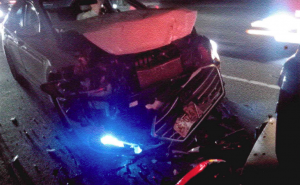
Clark Law Firm Secures Supreme Court Review of Decisions Barring Recovery for Ongoing Medical Treatment
The New Jersey Supreme Court granted an application filed by the Clark Law Firm to review lower court decisions about future medical bills in a crash case.
All drivers in New Jersey are required to have insurance for cases like this. The defendant driver here had a State Farm auto insurance policy. State Farm hired lawyers to prevent the injured plaintiff from getting any recovery so it would not have to pay out on the policy. As they do in nearly every case like this, State Farm lawyers hired a professional testifying doctor who in this case falsely claimed Linda did not sustain any permanent injury and implied she was exaggerating. Clark Law Firm lawyers overcame these tactics and prevailed at trial.
A Bergen County Superior Court jury found Linda sustained permanent injuries to her spine and wrists resulting in a $311,000 judgment for permanent life changes and lost wages. However, the judge who presided over the trial would not allow the jury to compensate Linda for the $236,000 she would probably have to pay for continued medical treatment. The judge expressed a philosophical disagreement with anyone ever incurring future medical bills at trial, despite longstanding law allowing for it. In denying the claim, the trial judge applied an old version of a statute which was no longer in effect. The updated version of the statute- which was enacted at the urging of the Supreme Court in an earlier decision- specifically allowed for these medical bill claims. Plaintiff accepted that partial judgment and filed an appeal of the trial judge not allowing Linda to recover for her future medical care.
The Appellate Division dismissed the appeal deciding that since the partial judgment was accepted, plaintiff was not allowed to seek more on appeal for the future medical bills. The appeals court also decided that in this situation, the plaintiff has to announce the intent to appeal the trial judge long before the Court Rules otherwise require, and preferably while the trial is still going on. The Appellate Division said nothing about the trial judge applying the wrong statute.
There is no automatic appeal to the Supreme Court in cases like this and only a very small percentage of applications are granted. In seeking review Clark Law Firm argued the decision of the trial judge to bar the future medical bills claim was clearly wrong and should have been summarily reversed. The petition for review further pointed out that dismissing an otherwise perfected appeal was an extraordinary measure. And further, that the Appellate Division mis-distinguished well settled Supreme Court law that clearly allows a plaintiff to accept a partial judgment and still appeal the denial of another claim in the same case. A party may accept the sum to which he is in any event entitled and still pursue a request for a determination on appeal which would increase that sum.
The petition asked the Supreme Court to answer three questions:
1. When the Legislature amends a statute at the recommendation of the Supreme Court, should a trial court have the discretion to apply the previous version because of a disagreement with the amendment?
2. Does the filing of a warrant to satisfy judgment pursuant to Rule 4:48 constitute a waiver of appellate issues outside that judgment?
3. Must a party decide and give notice of intent to appeal prior to the 45-day period set forth in Rule 2:4-1 and before the adverse party files a warrant to satisfy judgment or waive its right to appeal other issues?
On March 17, 2024 the Supreme Court accepted the appeal. The parties will be given a date for oral argument before the seven-member court and a written decision will thereafter be rendered. Lead counsel for Linda Brehme, Gerald Clark, commented, “Our client, Linda Brehme, has been treated very unfairly by this insurance company for many years.” The State Farm driver slammed into Linda in 2016. It refused to fairly pay the claim requiring a jury trial many years later. Clark further commented, “We will never give into these insurance defense delay tactics. We are humbled, optimistic and honored to advocate for Linda and many others like her before the highest court in our State. The record shows the trial court was misled into error here and we are confident justice will ultimately be achieved.”
The case is captioned Brehme v. Irwin, BER-L-7134-18. Details on the appeal including all relevant documents and the Supreme Court order granting the review petition can be found here: (https://www.clarklawnj.com/legal-resource/)
Gerald Clark
Clark Law Firm, PC
+1 877-841-8855
email us here
Visit us on social media:
Facebook
EIN Presswire does not exercise editorial control over third-party content provided, uploaded, published, or distributed by users of EIN Presswire. We are a distributor, not a publisher, of 3rd party content. Such content may contain the views, opinions, statements, offers, and other material of the respective users, suppliers, participants, or authors.


